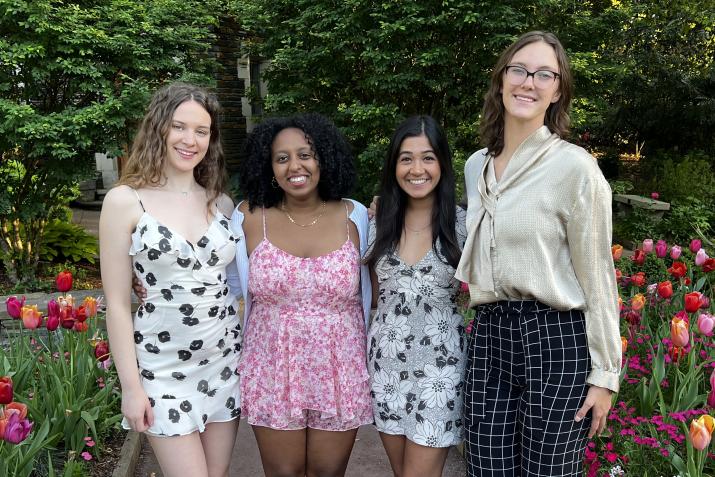
From left: Global health capstone students Mare Kozmar, Mihret Gebru, Ashna Ram and Payton Little
Published April 19, 2023, last updated on April 27, 2023 under Education News
When it came to selecting a senior capstone project, the choice for Mihret Gebru, Payton Little, Mare Kozmar and Ashna Ram was obvious. The four students, all majoring in global health, share a passion for promoting girls’ education and empowerment. And Smart Girls Uganda, a social enterprise working to empower school-aged girls in the East African country, needed that passion.
The global health capstone course, the final piece of an undergraduate global health major, assigns teams of students to work with clients to design a practical solution to a real-world problem. For Smart Girls Uganda, which provides waterproof backpacks containing solar-powered lamps and menstrual hygiene products to school-aged girls, the problem was fundraising.
"The Smart Girls Uganda team faces some difficulties in retaining existing donors and attracting new partners. It was on us to figure out a solution," says Little.
After several meetings with Jamila Mayanja, the chief executive officer of the organization, and plenty of additional research, the team devised a comprehensive fundraising plan and a 40-page report. The students will present their solution, along with four other capstone projects from the spring semester course, during a poster session from 1:45-3 p.m. on April 24 in room 040 Trent Hall.
An equally valuable part of the class is sharing findings with partner organizations. “Our recommendations and strategies have been compiled into a report that we will present to them," says Gebru.
The team developed four key strategies for Smart Girls Uganda to implement: a social media strategy that caters to donors, a stakeholder engagement strategy, a fundraising strategy focused on grants and competitions, and a partnership expansion for fundraising.
Working with Smart Girls Uganda aligned with each of the student’s personal and academic goals. Kozmar was drawn to the gender aspect, while the education and menstrual health angles appealed to Gebru and Little, respectively. For Ram, the capstone project presented an opportunity to apply what she had learned earlier in her undergraduate experience.
"I had a previous wonderful experience working with a non-governmental organization from Kenya through the Duke UNICEF Innovation Accelerator Program. Smart Girls Uganda appeared to be an organization that shared a similar commitment to making a positive impact,” she explains.
Kozmar says that most challenging aspect of the project was coming up with tailored solutions. “Identifying suitable donors and partnerships while comprehending the context was difficult yet gratifying. It was an exhilarating experience, and I aspire to apply this knowledge in my future endeavors with NGOs."


